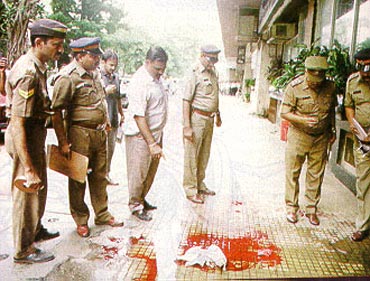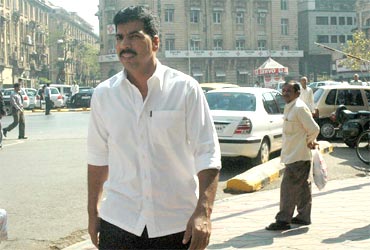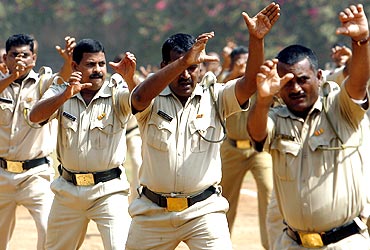 | « Back to article | Print this article |
Mumbai's underworld is back in business
Is there a connection between the Mumbai police's guns falling silent and the spurt in underworld activity? N Ganesh reports
There have been very few police encounters in 2010, and the last one was on April 7, of Dilip Yadav, a dacoit who was gunned down in a joint operation by the Economic Offences Wing of the Mumbai police and the Special Task Force of Uttar Pradesh at Malad in north Mumbai.
The police appears to have drawn a curtain on encounters following judicial intervention that put the encounter specialists in the dock.
There is a theory going around among many senior officials in the police force that the fear of being killed in a police encounter no longer looms over the gangsters, and who have therefore become more conspicuous.
The brazenness of the Mumbai underworld has been witnessed lately with the killing of gangster Farid Tanasha, a member of the Chhota Rajan gang on June 3 at his residence in Tilak Nagar, Chembur, a suburb in eastern Mumbai known to be a stronghold of the Rajan gang.
The police now suspects Bharat Nepali, a former Rajan gang member who is absconding, is wanted in 17 criminal cases and operates from foreign soil, to be behind the killing. Though Tanasha's killing may seem like one stray incident in the crime statistics of Mumbai, there are other incidents, too, which show clearly that the city's underworld is back in business.
Click NEXT to read further..
No one loves the 'encounter specialists' anymore
It is not the Dawood Ibrahims, Chhota Shakeels and Chhota Rajans who are at the forefront of the current spurt in crime, but their cronies who are determined to create a niche for themselves in the highly competitive world of the Mumbai underworld.
Gangsters like Bharat Nepali, Ravi Pujari, Bunty Pandey, Vicky Malhotra, Sunil Poddar are the ones who are calling the shots in the underworld.
Between 1993 and 2003, some 600-odd criminals were eliminated by the Mumbai police. A majority of these encounters have been credited to a few elite cops of the Mumbai police who are now out of action after facing a probe under various charges of fake encounters, custodial deaths and harbouring disproportionate assets.
Inspector Praful Bhosale and assistant police inspector Sachin Vaze faced a probe for the disappearance of Khwaja Yunus, arrested for the December 2002 bomb blast in a local bus at Ghatkopar.
Inspector Bhosale has 90 encounters to his name while Vaze has 63 encounters.
While subinspector Daya Nayak with 83 encounters recently got a reprieve, as the Supreme Court struck down the Maharashta Control of Organised Crimes Act case against him filed by his friend turned foe Ketan Tirodkar, he is still to be reinducted.
And inspector Pradeep Sharma, the most feared of the lot with 113 encounters to his name, is now under suspension facing a court monitored probe in the 2006 encounter of Ramnarayan alias Lakhan Bhaiya.
A matter of time before encounters are revived?
History seems to be repeating for the Mumbai police. In 1998, the Bombay high court came down heavily on them for the killing of alleged gangster Javed Fawda, who later turned out to be an innocuous peanut vendor. They face a similar situation now.
In 1998, strictures passed by the courts prompted the Mumbai police to put a complete freeze on encounters.
With that, the city witnessed a spate of violent face-offs among rival gang members. That year, the city registered a record 100 inter-gang shootouts.
Naturally, it was only a matter of time before the police called off their self-restraint. Once that happened in 1999, several prominent gangsters of the Rajan, Salem, Gawli and Naik gangs were eliminated.
So dreaded was the fear of police encounters that Sunil Ghate of the Gawli gang, who was booked in several criminal cases, surrendered before the high court despite being an elected corporator.
The Mumbai police's tryst with encounters with dreaded criminals began in1982 when gangster and dacoit Manya Surve was gunned down at Wadala by the Mumbai police team led by sub-inspectors Raja Tambat and Issac Bagwan.
"Encounters are like applying BandAid on the gangrene of crime. It seems to provide some respite in gang action but does not provide a permanent solution," a senior city police officer told rediff.com, who believes that effective policing is more potent than encounter killings in controlling crime.


